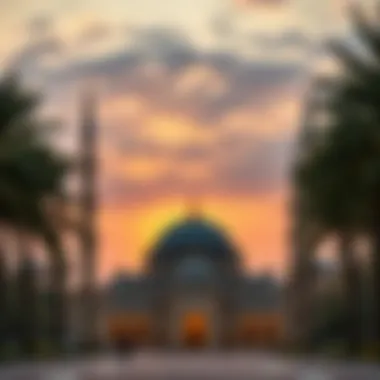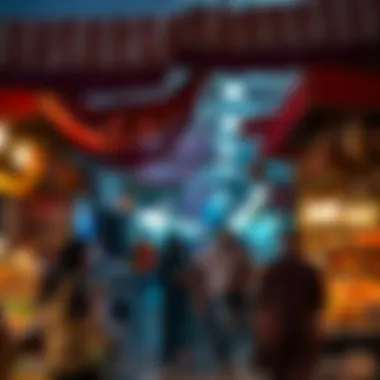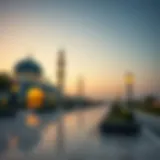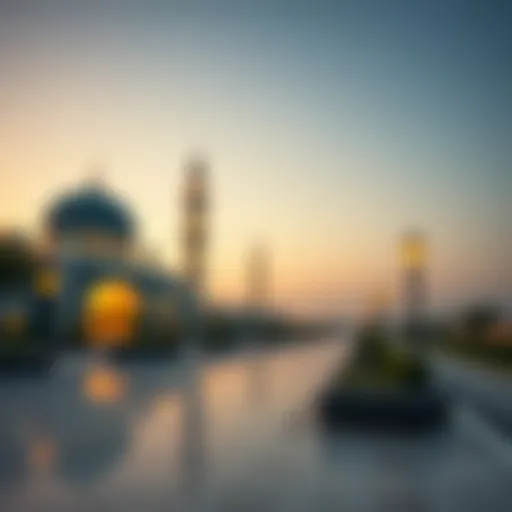Ramadan 2024 in the UAE: Key Dates and Insights


Intro
As the crescent moon emerges on the horizon, signaling the beginning of Ramadan, Muslims around the world, including those in the United Arab Emirates, prepare for a month steeped in spiritual reflection, prayer, and community. Ramadan in 2024 is anticipated to commence on the evening of March 10, with the exact date dependent on the sighting of the moon, which holds profound significance in Islamic tradition. It is not just a time of fasting, but also a period that impacts various aspects of daily life in the UAE, from religious observances to economic activities.
This holy month infuses the community with a sense of togetherness as families and friends gather for iftar, the evening meal to break the fast. Amidst the spiritual uplift, Ramadan also casts its shadows on commerce, real estate, and the overall lifestyle, especially in the bustling metropolis of Dubai.
Understanding the intricacies of this month is invaluable for investors, expatriates, and developers alike, who can gain insights into how the rhythm of life changes in this period. The interaction between the cultural and economic implications of Ramadan creates a vibrant atmosphere, alluring both residents and foreigners to engage in the festivities and partake in unique opportunities.
As we delve into Ramadan’s significance in the UAE, it’s essential to consider not just the sacred aspects, but how they intertwine with market trends, property dealings, and community dynamics. This knowledge serves as a guide for those navigating through various spheres during this pivotal month, ensuring they are well-informed and ready to embrace all that Ramadan offers.
Understanding Ramadan
Ramadan is more than just a month of fasting; it's the heart of spiritual renewal for millions of Muslims around the world. Understanding this sacred time provides key insights not only into its religious significance but also its cultural context, particularly in the UAE. This article delves into the vital aspects of Ramadan, emphasizing its importance in fostering communal ties, promoting gratitude, and enhancing spiritual consciousness.
Ramadan invites introspection and reflection. For those navigating the bustling lifestyle of the UAE, from real estate investors to expatriates, comprehending this period can enhance interactions and respect for local traditions.
The Historical Context of Ramadan
Ramadan traces back to the early days of Islam. It was during this month that the Qur'an was first revealed to the Prophet Mohammed in the year 610 CE. This profound event marks the month as a cornerstone of Islamic faith and practice. Over the centuries, Ramadan has evolved but remains anchored in its original purpose: to attain piety.
Historically, the fast during this month was observed more sparsely, but as Islam spread, so did the practices associated with it. It is steeped in a rich tapestry of traditions and stories that deepen its significance.
Ramadan's Significance in Islam
Fasting during Ramadan, known as Sawm, is one of the Five Pillars of Islam, which are the foundational acts of worship. The act of fasting from dawn until sunset is not solely about abstaining from food and drink. Instead, it's an opportunity to cultivate self-discipline, empathy for the less fortunate, and a greater connection to God.
In the UAE, Muslims break their fast with Iftar, a meal shared often among friends and family. This community spirit is pivotal as it encourages social bonding. Furthermore, daily prayers and Qur'an readings during Ramadan foster a deeper spiritual connection, emphasizing renunciation of everyday distractions.
Ramadan Date in the UAE
The timing of Ramadan is not just a mere pointer on the calendar; it holds deep significance for the Muslim community and the broader social fabric of the UAE. Understanding the dates surrounding this holy month facilitates better planning and participation in the various traditions and practices. For investors and homebuyers alike, knowing when Ramadan falls can influence market dynamics and property decisions due to changes in demand and consumer behavior during this period. It's a time when respect for cultural practices is paramount and should be on everyone’s radar.
Lunar Calendar and Moon Sighting
Ramadan follows the lunar Islamic calendar, which is about 10 to 12 days shorter than the Gregorian calendar most are used to. This year, it will begin around the evening of March 10 or 11, 2024, depending on the sighting of the moon—an event that holds substantial reverence. The declaration of Ramadan’s start is traditionally announced by local religious authorities after confirming the new moon. This leads to a sense of excitement, as families gather, communities come together, and everyone awaits the official sighting with bated breath.
As the moon transitions to a slender crescent, it marks the commencement of fasting from dawn until dusk. For/with many, this period is both a personal and communal journey that shapes not just their month, but their entire year ahead.
Expected Start and End Dates
Based on lunar observations, Ramadan is anticipated to start on March 10 or 11 and expected to conclude around April 9 or 10, culminating in Eid Al-Fitr, the festival of breaking the fast. This correlation of dates holds importance not just religiously, but socially and economically as well. During these specific days in Ramadan, the rhythm of life changes in the UAE; businesses often adjust their hours, social gatherings increase, and public spaces buzz with activity after sunset, especially during Iftar—the meal that breaks the fast.
Ultimately, for investors, homebuyers, and realtors, understanding these dates helps in making timely decisions regarding property investments and sales, as markets often slow during fasting hours but pick up significantly in the evenings and nights. With all its cultural and economic implications, staying attuned to the Ramadan timetable is beneficial, encouraging informed participation rather than mere observation.
"The start of Ramadan is not just a calendar date; it's a moment that shapes community ties and individual growth."
Understanding these elements provides a clearer lens through which one can view the nuances of daily life in the UAE during this month.


Observances and Traditions during Ramadan
Ramadan is not just a time for fasting; it is a period steeped in deep traditions and observances that foster community and spirituality. Throughout the month, Muslims engage in a multitude of practices that enhance their faith and promote a sense of belonging. This section delves into both the daily rituals and the celebration that culminates at the end of this sacred time, revealing how these customs contribute to a richer cultural fabric in the UAE.
Daily Practices: Fasting and Prayers
Fasting during Ramadan, also known as Sawm, is a fundamental tenet of Islam. But it’s not merely about abstaining from food and drink from dawn until dusk. This practice serves several purposes: it promotes self-discipline, reflects empathy for the less fortunate, and draws worshippers closer to Allah. The Suhoor, the pre-dawn meal, is an essential part of the day, where families and friends often gathered to enjoy a hearty meal before the fast begins. Focusing on nutrition becomes vital during this time, with many opting for wholesome options like dates, yogurt, and hydrating fruits.
Once the sun sets, the fast is broken with Iftar, usually starting with dates and water, a tradition followed by many that harkens back to the Prophet Muhammad. Cities fill with the aroma of sumptuous meals as communities come together to celebrate the breaking of the fast, emphasizing unity and compassion. Alongside fasting, prayers become more frequent, with many attending the Taraweeh prayers at night, where longer Quranic recitations enhance the spiritual experience of Ramadan.
Eid Al-Fitr: Celebrating the End of Ramadan
As the holy month draws to a close, the joyous occasion of Eid Al-Fitr awaits. This festival, marking the end of Ramadan, is not just about feasting but also about gratitude and charity. Before the Eid prayer, Muslims are required to give Zakat al-Fitr, a form of charity meant to purify those who fast from any indecent act or speech and to help the needy in their community.
On the day of Eid, the atmosphere is electric. After the early morning prayer, families dress in their best attire, often reflecting the vibrant culture of the UAE. It’s customary to visit friends and family, exchanging gifts and enjoying lavish meals that showcase a variety of traditional dishes. In recent years, public events, concerts, and fairs have become common, fostering a spirit of togetherness during this festive occasion.
"Eid Al-Fitr is not just a day; it's a renewal of intentions and commitments to our faith, reminding us of the values we uphold throughout the year."
Understanding these observances enriches one’s appreciation for their significance, building a bridge that connects diverse cultural practices under the shared values of compassion and faith. Ultimately, the traditions practiced during Ramadan lay the foundation for community cohesion and religious devotion, presenting an opportunity for reflection, growth, and connection among all layers of society in the UAE.
Cultural Impact of Ramadan in the UAE
The cultural impact of Ramadan in the UAE extends far beyond the individual act of fasting; it creates a mosaic of community bonding, spiritual reflection, and shared experiences. For expatriates and locals alike, this month serves as a reminder of collective values, morals, and traditions. The observance of Ramadan plays a crucial role in reinforcing social ties, fostering inclusivity, and shaping local customs.
Community Gatherings and Iftar
Community gatherings during Ramadan often form the backbone of social life in the UAE. Families, friends, and colleagues come together to break their fast, commonly known as Iftar. This meal is more than just about food—it's a social event that symbolizes unity and generosity. Throughout the month, public places and private homes buzz with the excitement of shared meals. In the evenings, you will find people gathering at malls, parks, and even office break rooms to enjoy communal Iftar meals.
The tradition of hosting large public Iftars further cements this sense of community. Local governments and organizations frequently sponsor events where individuals from all walks of life come together to enjoy meals. It’s a heartening sight to see diverse communities sitting side by side, sharing traditional dishes like dates, lentil soup, and biryani.
"Every evening during Ramadan, the sense of togetherness is almost palpable. Iftar dinners offer not just a meal, but a heartfelt celebration of community and connection."
Organizing such gatherings also fosters generosity. Many people opt to donate meals to those in need, making Iftar a time of compassion and charity, in line with the tenets of Islam. Local mosques play a significant role in these efforts, often serving hundreds of free meals to the less fortunate.
Ramadan Decorations and Atmosphere
As Ramadan approaches, the atmosphere in the UAE transforms significantly. Streets, homes, and shopping centers are adorned with beautiful decorations reflecting Islamic art and culture. Elegant lanterns, known as fanous, can be seen illuminating homes and public spaces, casting a warm glow that complements the nightly prayers.
The vibrant hues of blue, green, and gold dominate, and shops often get into the spirit by showcasing special holiday displays. Markets bustle with activity as vendors sell traditional items, from ornate dishes to beautiful decorations. The very air feels different—it’s imbued with a sense of anticipation and reverence.
In homes, the preparation for Ramadan is dated and filled with meaning. Families often begin to adorn their living spaces with intricate tapestries or wall hangings that echo the essence of this holy month. It becomes not just a tradition, but a form of artistic expression that bridges past and present.
These decorations create an ambiance that uplifts the spirit and signals the beginning of a month dedicated to reflection and devotion. The emphasis on aesthetics helps highlight the importance of spirituality and community during this blessed time.
In sum, the cultural impact of Ramadan in the UAE is profound. It nurtures community connections through shared meals and fosters a festive atmosphere that celebrates tradition and unity. Understanding these elements not only enriches the experience of observing Ramadan but also aids investors and expatriates in appreciating the deeper societal values at play during this significant time.
Ramadan's Influence on the Real Estate Market


The month of Ramadan brings with it not just a time of reflection and spiritual connection but also significant shifts in various sectors, including real estate. In the UAE, where a diverse demographic resides, the influence of Ramadan manifests in unique ways. Understanding these dynamics is paramount for investors, homebuyers, and industry professionals alike. During this holy month, the market sees both shifts and opportunities,
Impact on Buying and Selling Activity
Ramadan has a notable impact on buying and selling activities in the real estate market. Traditionally, the urgency seen in the market before Ramadan tends to lessen as people focus on fasting and spiritual matters. Homebuyers often delay major purchases, such as properties, preferring to devote their time to prayer and family gatherings.
However, this doesn't mean the market is completely dormant. For those in the know, Ramadan also offers unique opportunities. Sellers might adjust listing prices to attract buyers who are still active during this period, especially expatriates looking for affordable housing solutions.
Key Considerations:
- Timing: Buyers and sellers should be aware that post-Ramadan often witnesses a surge in activity, as people return to normal routines.
- Buyer’s Psychology: Understanding that potential buyers may be focused elsewhere can help in crafting strategies that entice serious prospects.
"For those looking to invest, it's wise to be patient. Ramadan can present discounts as sellers aim for a ready buyer during this time of year."
Changes in Property Demand
When it comes to property demand, Ramadan introduces a distinct rhythm to the real estate landscape. During this month, cultural factors significantly influence what types of properties are sought after.
For instance, many families look for larger homes that can accommodate additional guests for iftar gatherings. The need for spacious dining areas and attractive outdoor settings becomes crucial, as inviting friends and family over is a common practice.
Moreover, new cultural trends are reshaping demand patterns. Properties near mosques, for example, become more desirable, particularly for families who value ease of access during the month of prayer. Similarly, community-centric developments that celebrate the spirit of Ramadan draw more attention.
Emerging Trends:
- Demand for family living spaces: Larger homes become a priority as gatherings become more frequent.
- Accessibility: Proximity to places of worship plays a vital role for many buyers.
In summary, Ramadan is not just a period of religious observance; it also shapes real-world market dynamics. For investors, this season can offer opportunities that, if navigated wisely, can yield fruitful returns post-Ramadan.
Commercial Activities during Ramadan
During the month of Ramadan, commercial activities in the UAE experience a notable shift, both in pace and nature. The holy month presents unique opportunities and complexities for businesses, influencing everything from retail strategies to hospitality offerings. Understanding these commercial dynamics is essential for investors, homebuyers, realtors, expatriates, and developers alike, as they navigate a changing landscape significantly altered by the spiritual and cultural practices of Ramadan.
Retail Adjustments and Promotions
Retailers in the UAE devise clever adjustments during Ramadan to attract consumers who may have different shopping habits during this period. Traditional shopping patterns often change, as many consumers prefer to shop after sunset, coinciding with iftar—the meal breaking the fast. As a result, longer store hours and special promotions aimed at evening shoppers become increasingly popular.
These promotions often include:
- Discounts on staple foods: Essentials like dates, herbs, and spices see price cuts, appealing to families preparing for iftar.
- Unique Ramadan-themed products: Markets often introduce limited-edition items and festive decorations that resonate with the holiday spirit.
- Marketing campaigns focused on charity and giving: Retailers highlight their contributions to local charitable efforts, appealing to the community's sense of giving during Ramadan. This often increases foot traffic as consumers are drawn to brands they perceive as socially responsible.
In summary, the ability of retailers to adapt, promote relevant products, and connect with the community can serve as a crucial factor for success during Ramadan.
Dining and Hospitality Trends
The dining and hospitality sectors experience remarkable transformation during Ramadan. Restaurants, cafes, and hotels navigate the fasting period by adjusting their service offerings. While many establishments close during the day, the nighttime hours become bustling with patrons eager to enjoy elaborate iftar buffets and suhoor gatherings.
Key trends in dining during Ramadan include:


- Special Iftar Menus: Many restaurants curate unique iftar menus featuring traditional dishes. This not only satisfies the hunger accumulated throughout the day but also enhances the dining experience with a festive ambience.
- Increased demand for outdoor dining: The cooler evenings make al fresco dining enjoyable, with many establishments opting to set up outdoor seating arrangements.
- Social gatherings and events: Hotels often promote group iftar events for families and corporations, cultivating a sense of community. This trend further drives hospitality revenue, as venues become a choice destination for socializing.
In a nutshell, the dining landscape during Ramadan is rich and complex, loaded with considerations requiring savvy adjustments from business owners. Both retail and dining sectors need to be in tune with consumer sentiments to thrive.
“Understanding and reacting to the commercial shifts during Ramadan can make or break opportunities for stakeholders in the UAE.”
For further insights on Ramadan and its implications on commercial activities, you can refer to resources like Wikipedia or consult Britannica for a deeper understanding of its cultural significance.
Lifestyle Considerations during Ramadan
Ramadan brings not just a time of spiritual reflection but also diverse lifestyle considerations that profoundly affect the daily rhythms of life in the UAE. For residents, expatriates, and visitors, understanding these nuances becomes essential during this pivotal month. It’s more than just fasting; it’s about how to adapt to the changes that Ramadan introduces in various aspects of life, from health to work dynamics.
Health and Nutrition during Fasting
Fasting during Ramadan is a physical and spiritual practice that provides a unique opportunity to reflect on one’s health. The pre-dawn meal known as Suhoor is vital. Consuming balanced foods that include complex carbohydrates, lean proteins, and hydrating fruits can help sustain energy throughout the day. Eating adequately at Suhoor is crucial; options like oats, eggs, or yogurt, paired with plenty of water, can set the tone for a productive day.
Post-sunset, the first meal of the day, or Iftar, is a time of community and joy. Traditional dishes like dates and lentil soup are often on the table. However, it's essential to avoid overly heavy meals that can lead to discomfort. Flavorful grilled meats with a variety of salads or vegetable dishes can keep the spirit of the feast alive without compromising well-being.
A practical tip is to notice how one’s body responds to the changes in eating patterns. Staying hydrated between Iftar and Suhoor is imperative. To ensure proper hydration, aim to drink ample water and limit caffeinated beverages that can lead to dehydration.
"Health during Ramadan isn’t just about fasting—it's about nourishment and balance."
Finally, integrating moderate exercise can maintain fitness levels. Light walks or yoga sessions can help. It’s advisable to schedule this type of activity after the sunset meal, as that’s when the body can recover more efficiently.
Balancing Work and Spirituality
The unique demands of Ramadan mean that striking a balance between work commitments and spiritual observance is imperative. For many, work hours may shift, allowing time for midday prayers. Employers in the UAE often accommodate these changes, recognizing the significance of the month.
Working hours might shorten, which could affect productivity. However, this provides the opportunity to focus more on spiritual growth. Engaging in group prayers or community service initiatives during lunch breaks can foster a sense of camaraderie among colleagues.
For expatriates, embracing this balance can enhance understanding of local customs. During Ramadan, it can also be a good time to initiate conversations about the month’s significance with co-workers. Not only does this enrich relationships, but it promotes a respectful work environment that values cultural diversity.
Line management and prioritization of tasks may need recalibration during this month. It can become beneficial to set realistic goals, recognizing that energy levels might fluctuate. The objective here shouldn’t just be to maintain output but also to embrace the opportunity for reflection and personal growth.
In essence, balancing work and spirituality during Ramadan acknowledges the multidimensional experience of the month. Emphasizing well-being, both at work and in spiritual pursuits, not only leads to a more fulfilling Ramadan but also strengthens connections within the community.
Empowered with this understanding, individuals in the UAE can navigate the month with grace and intentionality, adapting lifestyles to embrace both the physical and spiritual demands of Ramadan.
End
The conclusion serves as a vital component in understanding the nuances of Ramadan in the UAE, providing a synthesis of themes explored and offering a reflective pause for the reader. This holy month stands not simply as a time of fasting but as a rich tapestry woven with cultural, spiritual, and communal significance. In analyzing the implications of Ramadan, one can appreciate how it binds the community together, transcending beyond religious observance to also affect economic activities, lifestyle changes, and social engagements within the region.
Reflecting on the Essence of Ramadan
At its core, Ramadan embodies a period of reflection and personal growth. It is an opportunity for individuals to reconnect with their faith and values, assess their priorities, and engage in self-improvement. The communal aspects of Ramadan, such as participating in communal iftar meals, encourage unity and a sense of belonging. In the UAE, this spirit of togetherness manifests in various ways, from family gatherings to public events that advocate for inclusiveness and understanding among the nation’s diverse population.
Moreover, Ramadan’s emphasis on charity, known as Zakat, impels individuals to consider their societal responsibilities. Many UAE residents actively support charitable organizations during this time, reflecting the essence of compassion and empathy that defines the month.
Future Implications for the UAE
The influence of Ramadan extends beyond the month itself, shaping both cultural and economic landscapes in the UAE for years ahead. With the growing expatriate community, there’s an increasing need for awareness and sensitivity towards Ramadan practices and traditions. Developers and real estate professionals, for instance, may find opportunities in tailoring residential offerings that cater not just to the local populace but also to the diverse mix of cultures present, ensuring a respectful environment during this sacred time.
In terms of commerce, retailers must remain agile in their strategies. The trends during Ramadan can lead to significant shifts in consumer behavior that may carry through the rest of the year. Understanding these behaviors fosters better marketing strategies that resonate with the community's needs and preferences.
"The essence of Ramadan is not only in the act of fasting but in the ripples it creates across society. It challenges norms, fosters unity, and sparks hope."















